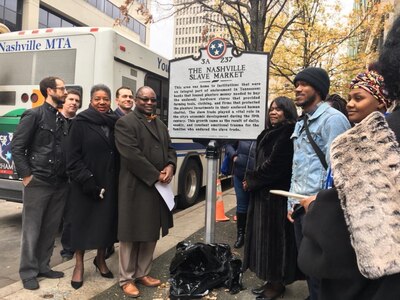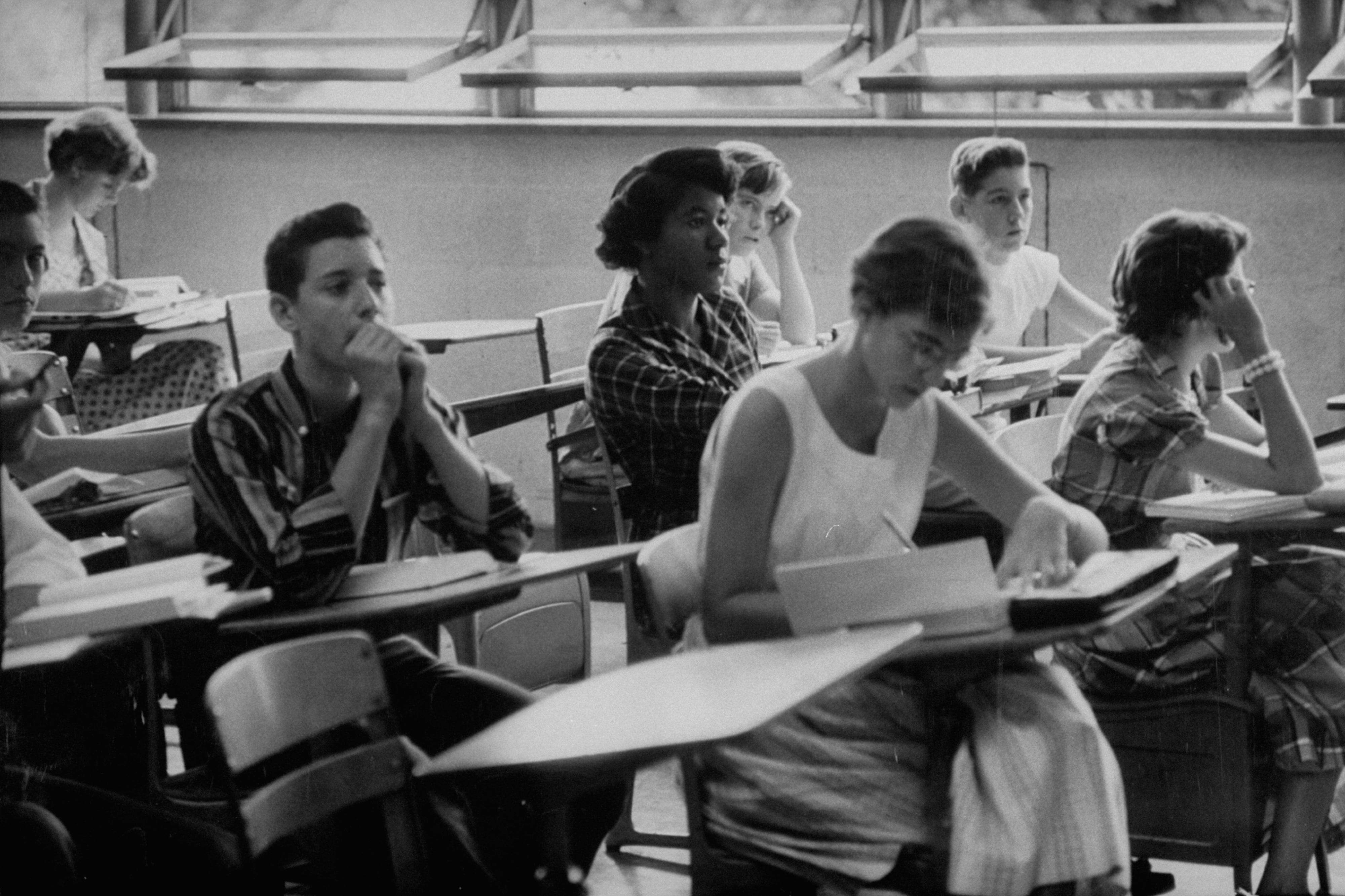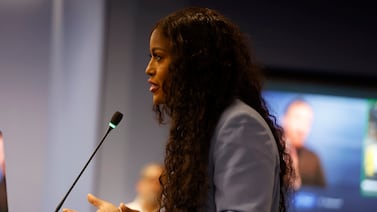Historian Learotha Williams remembers a poignant experience with a former student. The student grew up in East Nashville, but the first time she heard about the downtown market where enslaved people were sold was in college during a Black history course at Tennessee State University. This knowledge gap evoked anger.
“‘Dr. Williams, I’ve been living here my whole life,’” she said, according to Williams, “‘and this is the first I’ve heard of this.’”
Tennessee’s social studies curriculum requires instruction on a wide range of social, racial, and economic justice topics that cover state history, but some history professors say few students enter their classrooms having learned much about Black history and even fewer have learned about how Black people and people of color influenced Tennessee history.
“They don’t get a whole lot other than the most basic stuff that you might get during Black History Month,” said Williams. “A lot of Martin Luther King Jr., Rosa Parks, just exemplary African Americans.
“They have a little bit, but it’s not a lot,” he said. “And oftentimes it’s misinformation.”
The issues that Williams has noticed are part of a national deficiency in Black history education, according to research from the Johns Hopkins Institute for Education Policy. In its curriculum review, the institute found that Black history lessons in K-12 schools often lack cohesion and rigor.
And the distortions are not just in Black history.
Albert Bender, a writer, historian and Cherokee activist, said many Tennessee students and U.S. residents in general know little about Native American history. He cited a 2018 survey that found that roughly 40% of Americans believed Native Americans are extinct.
Specifically, he said few students know that when Tennessee became a state, the majority of its land was occupied by Indigenous people.
And although Tennessee’s social studies standards require instruction on the “cooperation” between Native Americans and white settlers, Bender said, “that just didn’t happen.”
“One of the longest wars in Indian history took place in Tennessee, between Cherokees and white invaders,” he said. “A lot of history of the Southeast doesn’t emphasize the long military struggle.”
State Rep. Gloria Johnson, who taught special education in Knox County Schools, stressed that educators should teach factual information based on evidence, even when those facts reveal the nation’s troubled past.
“We can teach the uncomfortable truths about this country and talk about them, and our kids do a great job understanding that,” said Johnson. “It seems to me the adults are the ones having the problem.”
What’s required vs. what gets taught
Tennessee’s social studies standards — detailed in a document more than 200 pages long — require instruction on a number of topics. The standards were overhauled in 2017.
The standards are well-regarded by the Fordham Institute, which rated Tennessee’s as “exemplary” in a report published in June.
Students learn the first half of American history in fourth and eighth grades, and the second half of American history in fifth and 11th grades. To cover state history, high schoolers are supposed to get lessons on the Highlander Folk School social justice center, the Tent City sharecroppers movement of Fayette County, the Nashville Sit-Ins during the Civil Rights Movement, and other racial justice and labor movements.
But students don’t always learn what’s required to be taught, said Bill Carey, who runs Tennessee History for Kids, an organization that provides booklets and other educational materials to schools. And teachers aren’t set up for success, he added. Many teachers struggle when teaching about people of color in state history because they have a lot of knowledge gaps themselves.
“The variation between what happens in one school system and what happens in another is absolutely vastly wide,” Carey said. “In defense of the teachers, they don’t have a lot of resources.”
Carey’s assessment is largely shared by research from the Johns Hopkins Institute for Education Policy, which found that educators are using websites like Pinterest and Teacherpayteacher to fill in the gaps because “teachers aren’t getting the support and training needed to create stronger curricula.”
In its 2019 report, the Woodrow Wilson Foundation, a nonprofit in Princeton, New Jersey, that provides grants and training to educators and aspiring educators, points to a different problem. It found fewer than half of U.S. adults can demonstrate a “basic” knowledge of history. This lack of historical knowledge overall isn’t because teachers are unprepared. Rather, the report faults the “heritage” approach to teaching history, a method that focuses on memorization of events, dates, and names.
The report states this approach has led to Americans being chronically underinformed.
“The problem is not that the schools have abandoned American history, the teacher force is uneducated, or the American history curriculum has been ravaged,” the report states. “The problem is not new. It’s perennial. Memorizing random facts doesn’t work.”
Adding to the challenges in preparation and instruction, Tennessee Gov. Bill Lee signed a politically charged law in May that restricts discussion on race in the classroom.
Nothing in the law changes what teachers are required to teach, but Carey says it will make teachers more afraid to touch sensitive topics in state history such as the Memphis massacre of 1866 when white mobs attacked Black neighborhoods following the Civil War.
“Teachers are just as required now to teach difficult subjects as they ever were,” he said. But, “I think [the new law] will empower people who don’t want this stuff to complain more.”
Addressing the knowledge gaps
Robert Bland, a history professor at the University of Tennessee, Knoxville, said it’s common in his course for college students to discover new aspects of history that they feel have been “hidden from them.”
To share these “hidden” topics earlier, Bland hosts seminars for K-12 history teachers at Knox County Schools once or twice a semester, helping them to freshen up their syllabi to include more “nuance” than just the “exemplary African Americans.”
Williams, the historian based in the Nashville area, also splits his time between campuses, teaching both at Tennessee State University, a historically Black college, and Volunteer State Community College, where many of his students are white and have never had a Black professor.
In his courses for teachers and students at the predominantly white college, he makes sure his students leave with resources to broaden their perspectives on contributions people of color have made to U.S. and state history.
“They got a heck of a lot of notes. They got a mini library going. And they got my phone number,” he said.
“They’re taking it back to Lafayette [County], they’re taking it to spaces where it might not be a whole bunch of Black folks or Black resources,” he added.
They’re also taking it to the streets with public history displays.
Years ago, after one frustrated student discovered the market where enslavers auctioned off Black people, Williams said his class pushed for the creation of a historic marker, at the corner of Fourth Avenue and Martin Luther King, Jr. Boulevard, just two blocks from the Andrew Jackson State Office Building in Nashville.

“That was the result of an angry student,” he said. “If we understand that slavery was Nashville’s first big business, there should be something, right?”
More than 150 years after enslavers sold the last person at that corner, Williams and his students raised money and convinced the Tennessee Historical Commission to erect a marker in 2018.
Williams hopes that more K-12 students will learn a comprehensive view of history that will empower them to lead similar public history initiatives. He added that waiting until college to give a more inclusive perspective of U.S. and state history evokes strong emotions from students who feel like information was withheld from them.
“A lot of them are angry; a lot of them are sad, disturbed,” he said. “And those are righteous emotions.”







